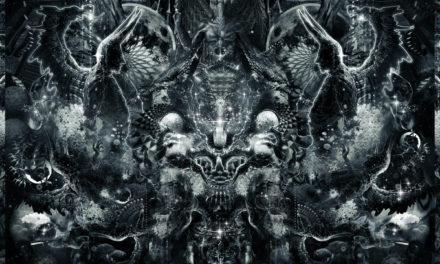
Kontravoid
Detachment
Artoffact Records
The arc of Cam Findlay’s work as Kontravoid has been one of aesthetic refinement. The 2012 self-titled debut LP introduced his take on synth music: a smoke machine and strobe-lit version of electronic darkwave whose gritty and saturated sonics have been the project’s calling card since. That sound has allowed Findlay to take Kontravoid through multiple genres and styles while maintaining a strong sense of identity; despite being an artist whose visual trademark is a featureless mask, there’s nothing anonymous about the his work. As with the excellent 2021 EP Faceless, new LP Detachment deftly applies those sonic markers to songs both melodic and driving to tremendous effect.
A not-so secret key to a lot Kontravoid’s best material is how good Findlay has gotten at synthpop hooks, and the record certainly doesn’t lack for them. Cuts like “For What It Is” and “Death Shot” have strong melodies woven into their arrangements of synth bass, snappy drums and Findlay’s processed vocals; the impact of their lead synthlines is a function of how dialed-in every element of the songs is to their delivery. There’s never been a more pop Kontravoid song than “Losing Game”, a cut that manages to split the difference between guest vocalist Chelsey Crowley of Nuovo Testamento’s nu-italo wheelhouse and Findlay’s own production and compositional trademarks.
The body music angle of the project is still well-represented on Detachment as well, with some interesting new angles introduced. If you’ve only experienced “Reckoning” via its hypnotic and utterly bizarre video, listening to music isolation from visual bombardment reveals some sneaky touches of big beat, expressed via its vocal sample punctuation and gated synthlines. “How It Ends” runs in a different direction, laying breakbeats underneath its pulsing waves of reverbed and panned electronics, a kind of robotic funk manifested via its syncopated bounce. Hell, “Sin Walker” is practically a futurepop jam, its arpeggios and tightly programmed drums evoking the melange of millennial dance music sounds that informed the industrial club genre.
The trick of Detachment is really how no matter what Findlay turns his hand to as a producer or performer, it still sounds like Kontravoid. The beatless synth-string led instrumental cut “In Reverse” is as characteristic of the project’s sound as the straight electro darkwave of “Fading”, or the menacing overture that is opening track “Awaken”. In a field crowded with acts mining the same influences and musical tropes, Kontravoid has ascended to best-in-class status by becoming a better version of what the project has been since the outset. For a catalogue whose recurring themes have been uncertainty, obscurity and self-doubt, Findlay has paradoxically become supremely confident in executing his musical vision, and Detachment is the proof. Recommended.






Just chucked it on the Wishlist! Thanks!
He had me with that smooth climb from atmospheric to ‘wait, I’m dancing” in Awaken. Beautiful, dark wizard.